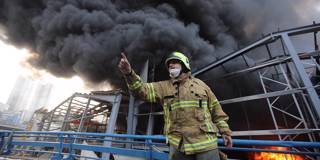Barely a month after the massive port explosion on August 4, Beirut residents have had to relive that tragedy following the onset of raging fires in the same area. But much more is at stake for the city: its identity as a haven for intercultural exchange, artistic creativity, and scientific research.
BEIRUT – For millennia, Lebanon has been a meeting point for different cultures and peoples, and also a victim of regional power struggles that have stood in the way of lasting peace. Yet even through the country’s long civil war (1975-90), Lebanon’s capital, Beirut, managed to preserve its open culture. As a bastion of free media, creative literary forums, and renowned academic institutions, it is the pearl of the Middle East.
But historical wounds do not heal easily. Despite adopting a new constitution and achieving a national renewal after the war, the Lebanese political system has remained riddled with corruption, leaving the state weakened and the economy dysfunctional. As the country has stumbled from one crisis to the next, its leaders have made no effort to change course, fueling widespread discontent.
On October 17, 2019, Lebanese citizens took to the streets nationwide, denouncing the political class and demanding the kind of radical institutional and economic reforms that the country desperately needs. But this was no “Lebanese Spring.” The demands were ignored, and Lebanon, like the rest of the world, soon found itself confronting the COVID-19 pandemic. For much of this year, the need for social distancing has effectively stifled popular mobilizations.

BEIRUT – For millennia, Lebanon has been a meeting point for different cultures and peoples, and also a victim of regional power struggles that have stood in the way of lasting peace. Yet even through the country’s long civil war (1975-90), Lebanon’s capital, Beirut, managed to preserve its open culture. As a bastion of free media, creative literary forums, and renowned academic institutions, it is the pearl of the Middle East.
But historical wounds do not heal easily. Despite adopting a new constitution and achieving a national renewal after the war, the Lebanese political system has remained riddled with corruption, leaving the state weakened and the economy dysfunctional. As the country has stumbled from one crisis to the next, its leaders have made no effort to change course, fueling widespread discontent.
On October 17, 2019, Lebanese citizens took to the streets nationwide, denouncing the political class and demanding the kind of radical institutional and economic reforms that the country desperately needs. But this was no “Lebanese Spring.” The demands were ignored, and Lebanon, like the rest of the world, soon found itself confronting the COVID-19 pandemic. For much of this year, the need for social distancing has effectively stifled popular mobilizations.